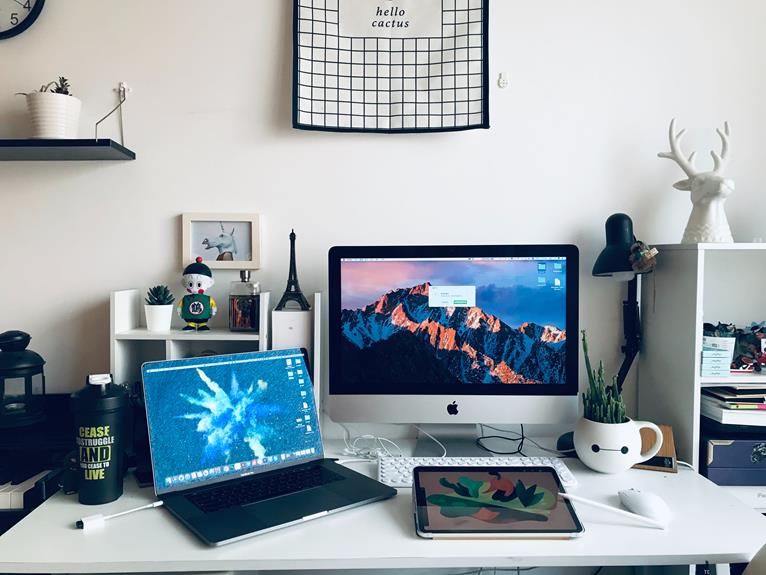You know the saying, 'A cluttered desk is a sign of a cluttered mind.' But have you considered the impact of your home office setup on your mental well-being and productivity? Your screen may be hiding more than just digital files. It could be concealing signs of mental health struggles, symptoms of burnout, and productivity challenges.
In this guide, we'll explore the hidden implications of your home office environment and provide strategies for creating a workspace that promotes mental clarity, focus, and overall well-being. Let's uncover what's lurking behind your screen and transform your home office into a place of productivity and mastery.
Key Takeaways
- Clutter and disorganization in the home office can impair concentration and productivity.
- Mental health struggles can manifest as lack of communication and cognitive decline, and it's important to recognize symptoms and seek support.
- Burnout can be identified by chronic fatigue, decreased performance, cynicism, and physical symptoms, and can be managed through self-care and establishing boundaries.
- Uncovering productivity challenges can be done through time blocking, creating a distraction-free environment, prioritizing tasks, task batching, and incorporating regular breaks.
The Impact of Clutter and Disorganization
Are you struggling to focus and be productive in your home office because of clutter and disorganization? The consequences of clutter are more significant than you might realize. It can impair your ability to concentrate, increase stress levels, and decrease overall productivity.
When your workspace is disorganized, it becomes challenging to locate essential documents or tools, leading to wasted time and frustration. On the other hand, the benefits of organization are numerous. A tidy and well-organized workspace can enhance your focus, reduce stress, and boost efficiency.
Knowing where everything is and having a clear, clutter-free environment can lead to a more peaceful and productive workday. By implementing effective organizational strategies, such as decluttering regularly, establishing a filing system, and keeping your desk clear, you can create an environment that promotes success.
Embracing organization in your home office won't only improve your productivity but also contribute to a sense of control and mastery over your work environment.
Signs of Mental Health Struggles
Feeling overwhelmed or constantly on edge while working in your home office? It's important to recognize signs of mental health struggles that may be impacting your work.
Emotional isolation, where you feel disconnected from others, can be a warning sign. This could manifest as a lack of communication with colleagues, avoiding social interactions, or feeling detached from your usual support system.
Additionally, keep an eye out for cognitive decline, such as difficulty concentrating, making decisions, or remembering tasks. These struggles can affect your productivity and quality of work.
If you find yourself experiencing these symptoms, it's essential to reach out for support. Consider speaking with a mental health professional or confiding in a trusted individual.
Recognizing Symptoms of Burnout
Your home office screen may be hiding signs of burnout that you need to recognize and address for your well-being. Burnout often stems from a lack of work-life balance and ineffective stress management. Recognizing the symptoms of burnout is crucial for maintaining your mental and physical health. Here are some key symptoms to watch out for:
| Signs of Burnout | How to Address it |
|---|---|
| Chronic fatigue | Prioritize self-care and consider adjusting your workload. |
| Decreased performance | Take breaks, set boundaries, and seek support from colleagues. |
| Cynicism and negativity | Practice mindfulness and engage in activities that bring you joy. |
| Physical symptoms | Consult a healthcare professional and make time for regular exercise. |
| Insomnia | Establish a relaxing bedtime routine and limit screen time before bed. |
Recognizing these symptoms early on can help you take proactive steps to address burnout. It's essential to prioritize work-life balance and implement effective stress management techniques to prevent burnout from negatively impacting your well-being.
Uncovering Productivity Challenges
Uncovering productivity challenges while working from home requires identifying potential distractions and implementing effective time management strategies. To truly master productivity in your home office, consider the following:
- Time Blocking: Allocate specific time slots for different tasks, allowing you to focus entirely on one task at a time.
- Distraction-free Environment: Create a dedicated workspace free from potential distractions such as TV, household chores, or noisy environments.
- Prioritization: Utilize techniques like the Eisenhower Matrix to prioritize tasks based on urgency and importance, ensuring that your efforts are directed towards high-value activities.
- Task Batching: Group similar tasks together to minimize context switching and enhance efficiency.
- Regular Breaks: Incorporate short, rejuvenating breaks to maintain focus and prevent burnout throughout the day.
Strategies for Creating a Healthy Workspace
To create a healthy workspace, prioritize ergonomic furniture and proper lighting to support your physical well-being while working from home. Ergonomic furniture plays a crucial role in maintaining good posture, reducing the risk of musculoskeletal issues, and promoting overall comfort during long hours of work. Investing in an adjustable chair with proper lumbar support and a desk at the right height can significantly improve your work environment. Additionally, proper lighting is essential for reducing eye strain and boosting productivity. Natural lighting is the best option, so try to position your workspace near a window to benefit from natural light. If natural light is not readily available, consider investing in adjustable, full-spectrum lighting to mimic natural light indoors. Below is a table summarizing key considerations for creating a healthy workspace:
| Aspect | Description |
|---|---|
| Ergonomic Furniture | Invest in adjustable chair and desk |
| Proper Lighting | Utilize natural light or full-spectrum |
| Posture Support | Prioritize lumbar support |
Frequently Asked Questions
How Can I Effectively Balance My Work and Personal Life While Working From Home?
To effectively balance work and personal life while working from home, prioritize time management and self-care. Set boundaries, create a dedicated workspace, and communicate with family about your schedule. Organize your workspace for efficiency and create a routine that includes breaks for relaxation.
What Are Some Tips for Maintaining a Healthy Work-Life Balance in a Home Office Environment?
To maintain healthy habits and set priorities in a home office, start by creating a dedicated workspace, setting boundaries, and sticking to a schedule. Remember to take breaks, stay active, and prioritize self-care to achieve a healthy work-life balance.
Are There Any Specific Strategies for Managing Distractions and Staying Focused While Working From Home?
To manage distractions and stay focused while working from home, establish a dedicated workspace, set clear boundaries, and create a schedule. Minimize interruptions, prioritize tasks, and take regular breaks to maintain productivity and mental clarity.
How Can I Set Boundaries Between Work and Personal Life When My Home Office Is in the Same Space as My Living Area?
To set boundaries between work and personal life when your home office shares space with your living area, organize your workspace to physically and mentally separate the two. Use dividers, designate specific work hours, and create a clear transition ritual.
What Are Some Ways to Stay Motivated and Avoid Procrastination While Working From Home?
To stay motivated and avoid procrastination while working from home, set clear goals, create a dedicated workspace, take breaks, and establish a routine. Prioritize tasks, minimize distractions, and reward yourself for completing tasks. Stay focused and disciplined.





